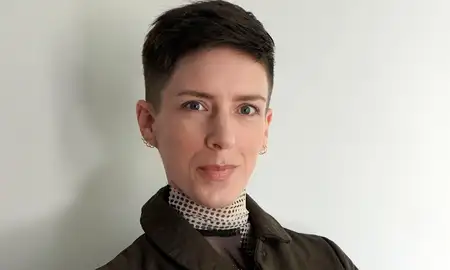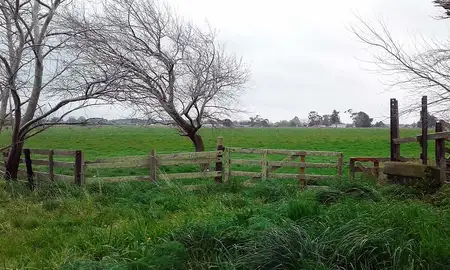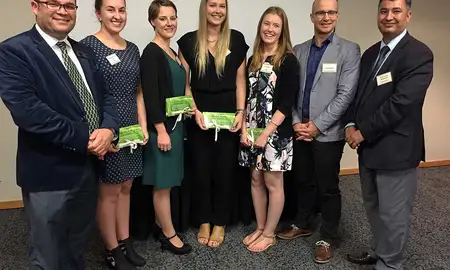
Mahalia Tapa-Mosen.
Mahalia Tapa-Mosen, Te Ātihaunui-a-Pāpārangi (Whanganui), Ngaa Rauru Kiitahi, did a mix of distance and on-campus study over 12 years.
“As time went by I had a lot of health issues, but I felt really supported by my lecturers and I’m very grateful for that. There were a couple of times when I thought ‘No, I’m out’, but eventually the need to complete it took over," she says.
The journey towards a Bachelor of Resource and Environmental Planning (BRP) began when Mahalia was working as a receptionist in the Whanganui offices of Ngaa Rauru Kiitahi.
“I saw we needed more expertise in the environmental and planning space. There was a lot of correspondence coming across the desk regarding work with the Department of Conservation, work with local councils, consents in the area - all this resource management and environmental work that was occurring.
“I always had an interest in working in the environmental space and I wanted a profession that would help in terms of advocacy for Māori rights and understanding the legislative barriers and institutional systems that contribute to certain environmental outcomes for Māori," she explains.
For Mahalia, the most empowering aspects of her degree were the Māori specialisation papers she took.
“I wasn’t super confident in my own Māoritanga when I went to uni. Because there’s a lot of content about the history of New Zealand, the opportunity to learn te reo, and a lot of insight into institutional systemic racism in this country, I was able to go out and recognise these things in the workplace. That, combined with working for Ngaa Rauru and later for local government, enabled me to say ‘Oh that’s what’s going on here. This is where our level of capability is at, and this is what is needed to assist our planners to better engage with Māori'."
Learning some te reo gave her confidence and widened her understanding of the context in which she would be working as a planner. She also took pleasure in the Māori research course.
“That was great, really awesome, because it broke down Western versions of knowledge versus Māori versions of knowledge. It was like seeing behind the curtain, like the Wizard of Oz, understanding that what we see on the surface is underlaid by something else.”
She says the planning course gave her insight into resource management and how the system worked as it applied to Māori.
“The professional practice courses were particularly helpful in terms of practical information. It was about knowing your expertise and the areas in which you could comment as a professional.
“From a Māori rights perspective, I always took that on board going into work with other planners, reminding them that they were not the experts when it came to te ao Māori.”
Mahalia recalls attending an educational wānanga back home that explored the Western and Māori science of Kaitiakitanga (guardianship and protection of the environment.) It gave her an opportunity to explain how the regulatory system around consents works.
"The kind of stuff our people don’t know in depth. Planning is a foreign language to lots of people, unless you’re in that space."
Her degree helped Mahalia secure a job with Environment Canterbury, where she worked as a consent planner with a focus on improving consent planner capability in working with Māori. That experience, together with work with her own iwi, led to her new job as a Wellington-based policy analyst.
She says she thinks a lot about where she wants to go in the future.
"I really enjoy identifying as a planner because at a high level I resonate with a lot of principles that I believe are core to planning. Improving the quality of the environment and making the world a better place for people – that’s the stuff I care about.
“Long term it’s always going to be that I will go home and work for my people in some capacity. What the shape of that looks like I’m not sure at the moment, because I’m learning how to get the skills I need to be as effective as I can be for them. My degree put me on a path where I can start developing those skills.
“When it feels like the right time to go home, I will go home. At the end of the day that’s always been the dream.”
Interested in planning?
Related news
Flexible study options a perfect fit for planning student
Master of Resource and Environmental Planning student Julia Kingham lives and studies in Taiwan.

Māori perspective on housing plan recognised
A report by planning academic Dr April Bennett to bring an understanding of Māori cultural about place to a new residential housing project in the Manawatū has been recognised by the New Zealand Planning Institute.

Planning students offer hope for people and planet
Developing affordable housing and finding solutions for conservation and hazard planning are among the special interests of four top students from Massey University's Bachelor of Resource and Environmental Planning (BRP) programme, recently awarded prizes by the Palmerston North City Council.
